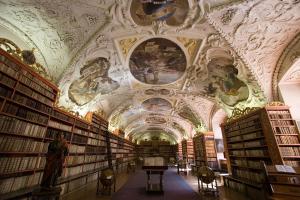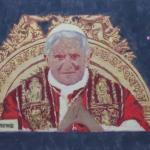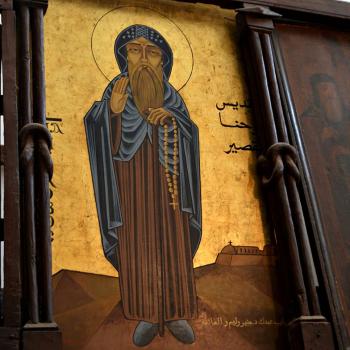
One of the things the early desert father and mothers learned is that different people were called to different kinds of livelihoods, different goods. For them, that good was that of an ascetic life, one which was to be not only simple, but free from worldly goods. They radically entrusted themselves to the benevolence of God, trusting that God would help them not only survive in some of the harshest living conditions possible, but they would come to experience the glory of God for themselves as they cast away all their earthly cares. Even books, which could contain some helpful insight and wisdom, were see as goods which they should abandon and cast aside. If they didn’t, then there would be the temptation to rely so much on books, and what is written in them, they would study the books and come to know facts without knowing the experience of truth of those facts. This was especially true in their era, for back then, books were much more expensive, much more valuable than they are today. Possessing any book, unless extremely necessary, would indicate the would-be religious has not entirely given up their former way of life, that they still held onto earthly goods; indeed, it could be said that they might as well possess gold or gems because of how they could help in their material existence. Thus, Abba Macarius told Abba Theodore of Pherme, if he wanted to do what was best, he would sell the three books he owned:
Abba Theodore of Pherme had acquired three good books. He came to Abba Macarius and said to him, ‘I have three excellent books from which I derive profit; the brethren also make use of them and derive profit from them. Tell me what I ought to do: keep them for my own use and that of the brethren, or sell them and give the money to the poor?’ The old man answered in this way: ‘Your actions are good; but it is best of all to possess nothing.’ Hearing that, he went out and sold his books and gave the money for them to the poor. [1]
Those in the desert were expected to contemplate and experience God, not in and through the reading of words, but through silence and the encounter they could have with God in that silence. It did no good for them to be reading all about the spiritual life if they were unwilling to live it themselves. Thus, though books could teach them good things, they could and would learn more, and achieve more, if they gave them away and embraced a life of labor, prayer, and contemplation. Due to the wisdom contained in them, a religious community, as a whole, might possess some books, but that meant, no monk themselves actually owned them. And though, it is true, a monk, if they were called to the priesthood, would probably need a few books in order to perform clerical duties, the desert community limited those who could and would become a priest, making sure that those who were elevated to the priesthood knew how it could and would hinder their religious vocation. Those who were made priests, then, saw that they gave something up in order to serve their greater community, and often, they did so only after being ordered to become a priest. Even then, even if someone were to become a priest out of obedience, they might, after ordination, try to avoid their priestly responsibility and return to the simple life they had grown to love. [2]
We are told that Abba Theodore sold his books, but it seems, like so many who have been drawn to books, he eventually returned to his old habit and started collecting them again. And, since books indicate wealth, it seems that Theodore drew attention to himself, giving thieves a reason to steal from him. Or perhaps, the next story related to him connects, in some way, with the first story, and we are told in it the way in which Theodore “gave” his books away. What is clear is that he almost lost everything, including his habit, because of his possessions, including, and especially his books, but because he was willing to have the thieves take everything he owned but his habit, he was able to retain his habit and his place in the monastic community:
Three thieves came to him one day and while the first two held him, the third took away his property. When he had taken the books, he wanted to take the habit as well. So he said to them, ‘Leave that.’ But they did not agree. So, fighting with his hands he pushed them both away. Seeing this, they were frightened. Then the old man said to them, ‘Do not fear; divide these things into four parts: take three and leave me one.’ So they did this and in his part he got the habit which he used for the synaxis. [3]
Theodore was able to the synaxis, the eucharistic gathering of the community, in his habit because he finally was able to truly give up his possessions, allowing the thieves to take everything he had but his habit. In this way, he not only preserved his habit, but what the habit represented, that is, his monastic vocation. Before he could do so, he had to realize that he had let himself go. The good found in his books distracted him from the good which he was called to follow and engage. It was not that books are bad, indeed, as we read, he and his community profited from them, but the issue is that the profit to be had in them was less for them and the community than the profit they would receive by giving them away and finding themselves living the life intended for them This is the lesson we should also learn from these two (possibly connected) stories. It is not that we are to deny the good of those works or practices or things which we are not to engage, but rather, we are to realize we might be called to other works, other goods. If we try to take on and embrace a good which is not for us, we can find ourselves losing others which are better suited for our way of life. Thus, we should try not to attach ourselves to the wrong kind of good, because, though we might gain from it, the gain will be far less for us than what we could otherwise have attained. And sometimes, when we learn this, when we learn that we have become diverted from a greater good, we might have to accept a loss, such as the loss Theodore had with his books being taken from him. If we do, then the loss will eventually become the foundation for something new, something that will become even greater than what we lost.
[1] The Sayings of the Desert Fathers. trans. Benedicta Ward (Kalamazoo, MI: Cistercian Publications, 1984), 73 [Saying of Abba Theodore of Pherme #1].
[2] They also saw ordination to priesthood was connected to power and authority, something which they also wanted to give up. They believed those who wanted to become a priest tended to be the worst candidates for the priesthood. This is why, though we find many of them often becoming priests, because the community did not priests to help celebrate the eucharist, most of them did as much as they can to avoid becoming one; this is true throughout the monastic tradition, and not just in its earliest stages, as we can see represented in the life of St Sabas: “He postponed, however, consecrating the cave, that is, the church built by God, because he did not wish to be ordained priest or in any way to be appointed a cleric; for he said that the desire to be made a cleric is the origin and root of thoughts of love of power,” Cyril of Scythopolis, The Lives of the Monks of Palestine. Trans. R.M. Price (Collegeville, MN: Cistercian Publications, 1991), 111 [Life of Sabas].
[3] The Sayings of the Desert Fathers, 78 [Saying of Abba Theodore of Pherme #29].
Stay in touch! Like A Little Bit of Nothing on Facebook.
If you liked what you read, please consider sharing it with your friends and family!
N.B.: While I read comments to moderate them, I rarely respond to them. If I don’t respond to your comment directly, don’t assume I am unthankful for it. I appreciate it. But I want readers to feel free to ask questions, and hopefully, dialogue with each other. I have shared what I wanted to say, though some responses will get a brief reply by me, or, if I find it interesting and something I can engage fully, as the foundation for another post. I have had many posts inspired or improved upon thanks to my readers.













